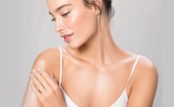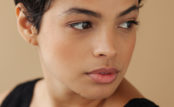 Google ‘Moroccan Oil’ and you’ll get about 14 million hits. But I’ll save both you and the Berber women of Morocco some grief with some quick advice: Don’t buy it. Buy Argan instead.
Google ‘Moroccan Oil’ and you’ll get about 14 million hits. But I’ll save both you and the Berber women of Morocco some grief with some quick advice: Don’t buy it. Buy Argan instead.
What’s the difference? And why the hype about Moroccan, er, argan oil in the first place?
Aside from the obvious fact that people really love their skin, and put out exorbitant dollars to prove it, and that Moroccan stuff is just so, well, exotic, there’s been much hype in recent years about argan oil and the many things that it does.
For those with more than a passing interest in natural skin care, argan oil is the natural skin care product of choice, for anti-aging, for skin, even for your hair and your nails. You can also cook with argan oil as it’s high in antioxidants and has a slightly nutty flavor, though you shouldn’t cook with cosmetic argan.
Argan oil just may live up to all this hype about being that “liquid gold” for your body and your attempt to look young and beautiful and help the planet while you do it. But as with all things, it pays to be informed before you hit the ‘Order Now’ button. And in this article we’ll discuss argan oil, how to use it and what to look for in an argan product.
But let’s start with the basics.
About Argan Oil
Argan oil is an oil produced from the Argania spinosa tree native to the deserts of Morocco. Used for at least 3,500 years and originally by the ancient Phoenicians, argan is unusually high in antioxidants and has culinary, medicinal and cosmetic applications. Of the latter, argan is used to:
- moisturize the skin
- reduce wrinkles and sun damage
- minimize stretch marks
- treat eczema and psoriasis
- prevent acne
 And those are just the skin benefits of argan. You can also use argan oil as a hair conditioner and to strengthen your nails. Are you a culinary buff? Roasted argan oil can be substituted for olive oil though most of the argan proffered to North Americans is the cosmetic variety.
And those are just the skin benefits of argan. You can also use argan oil as a hair conditioner and to strengthen your nails. Are you a culinary buff? Roasted argan oil can be substituted for olive oil though most of the argan proffered to North Americans is the cosmetic variety.
Argan oil is particularly high in antioxidants and skin-friendly nutrients. Though olive oil boasts higher levels of healthy fats, argan is the winner in a skin-care slugfest, with high levels of:
Vitamin E (Tocopherol) – A powerful antioxidant and fighter of body-aging free radicals, vitamin E heals aged skin. There’s almost 300% more vitamin E in argan than in olive oil.
Oleic and Linoleic Acids – Essential to production of prostaglandin, oleic and linoleic acids help to reduce inflammation and are powerful healers.
Squalene – Another powerful antioxidant, squalene has anti-bacterial properties and is an excellent treatment for eczema, psoriasis and acne.
Polyphenols – Nature’s own sunscreen, polyphenols offer UV protection, reduce sun damage and fight those free radicals that expedite the aging process.
Natural Antioxidants – Plenty of these in argan oil. That’s a plus, because antioxidants protect against sun damage and environmental factors like pollution, and in high enough quantities, give the skin a natural glow.
More than just a natural moisturizer, argan makes an excellent hair conditioner and can treat a variety of hair problems, from dry scalp to splits ends.
When done in the traditional method, extraction of argan is a time-consuming and arduous process in which the Berber women, who perfected the technique, collect kernels from the argan tree and grind, knead, decant and filter the product, from the kernels of the argan fruit to the argan that ends up in your bathroom cabinet. One liter of argan oil constitutes a tree’s full season of fruit.
Unlike Moroccan Oil, which is parlance for argan mixed with additives and mass-produced by factories in Casablanca, true argan oil is undiluted and extracted by hand. People interested in natural skin care and the cosmetic benefits of argan should opt for the latter.
In addition, there are ethical reasons why argan is preferable to Moroccan Oil that we’ll review later in this article. But first, let’s get to those many uses of argan oil and see how it may very well be one of the best multi-taskers out there for your beauty and radiance.
How to Use Argan Oil
Like a Swiss Army knife, argan oil does many things, and it does them well. That’s largely attributable to the many antioxidants found in argan, assuming you buy it pure. Argan is light in texture and absorbs quickly into the skin without leaving a greasy residue.
For Your Face – Argan oil is free of preservatives, including those ugly parabens linked to heightened risk of breast cancer. As such, it’s an excellent moisturizer, for the face or the body. For the first option, gently apply argan in a circular motion, with your ring or middle finger. Do this twice a day – one in the morning and again in the evening, and voila! – natural treatment for wrinkles and acne.
For Your Body – The polyphenols in argan make it a powerful healer of sun-damaged skin. You can also use argan to reduce stretch marks which, considering that up to 90% of mothers develop these biological scars, make argan an attractive option for skin health and natural beauty. Argan also reduces risk of psoriasis and may protect against eczema.
To use argan on your body, apply to the affected area after a bath or shower. You can use argan by itself or mix it with your regular body moisturizer. Apply liberally.
For Your Nails – Not an old wives’ tale, argan really does strengthen the fingernails, soften cuticles and add glow to otherwise dull nails. But don’t take my word for it. Mix equal parts argan and lemon juice and paint the solution on to your nails with a brush and see for yourself.
For Your Hair – More than just a natural moisturizer, argan makes an excellent hair conditioner and can treat a variety of hair problems, from dry scalp to splits ends. More over, argan adds a shine to otherwise dull hair and the rich nutrient content helps argan reduce build-up of chemicals from common hair products.
To treat damaged hair with argan, apply a generous amount to your hair, starting at the ends. Then wrap your hair in a warm towel. Wear it for at least 30 minutes, or overnight.
For dandruff or dry scalp, start with the ends, as instructed above, but go further into the roots. Do this once or twice each week. Got frizzy hair? Rub one to two drops between your palms and scrunch into the ends of your hair.
 Told ya argan is a multi-tasker. Just remember that cosmetic argan is not roasted during the extraction process and for that reason is not recommended for cooking.
Told ya argan is a multi-tasker. Just remember that cosmetic argan is not roasted during the extraction process and for that reason is not recommended for cooking.
Don’t Buy Moroccan Oil
So far we’ve covered the basics of argan oil and its cosmetic applications. But there’s more going on with argan oil than you might be aware. And if you’re concerned about your fellow man and his ability to make an honest living, I repeat: don’t buy Moroccan Oil.
A little history. Though argan has been used for thousands of years, it went pretty much unnoticed until the early 1990s, when the European cosmetics industry took note of argan and its high antioxidant content. Recognizing a good thing, they moved in and set up modern factories in Casablanca that monopolized the extraction process.
As you can imagine, this shift in production did little to preserve the integrity of the product, to say nothing of the Berber women whose lives were so intertwined with argan oil production, who lost their stake in argan extraction, and the socio-economic benefits that came with it.
One of the biggest issues was that the major skin labels often portrayed the Berber women as playing a major role in argan production and being rewarded for their work. In fact, the women had little to do with argan production in factories in the early 1990s. The situation was enough to motivate the German Government Development Agency (GTZ) to look into the matter. Change was afoot…
Unlike Moroccan Oil, which is parlance for argan mixed with additives and mass-produced by factories in Casablanca, true argan oil is undiluted and extracted by hand.
In 1995, the GTZ and the German Federal Ministry of Economic Cooperation and Development outlined a strategy with Moroccan authorities to set up a series of fair trade co-operatives, in which Berber women would again extract argan by hand, with health care and educational opportunities for the women and their families.
The shift continues. The argania region was declared an UNESCO-protected biosphere in 1998. And though much of the argan oil sold today is diluted and manufactured in factories, a reputable argan label will disclose where the product is extracted. At present, there are roughly 50 argan oil fair trade co-operatives in Morocco.
This brings us back to where we started. Avoid Moroccan Oil, more accurately described as argan oil with additives, produced in a modern factory by a manufacturer portraying the Berber women on the product labelling. Contrary to what these labels want you to believe, the Berber women reap little to no socio-economic benefits from such products.
Buy Pure Argan Oil
Argan oil really is liquid gold. And it’s worth putting out the extra dollar for argan in its purest form.
Buy argan oil from a small or mid-sized company. Generally speaking, they’re less likely to mass produce argan in a factory and more likely to extract the product manually, in a fair trade co-operative, by the experienced hands of the Berber women and with competitive wages, flexible working conditions and health care opportunities for the women and their families.
As well, remember that argan oil is rich in antioxidants and skin-friendly nutrients. When diluted, as some skin companies do, the product loses much of its health and cosmetic value.
Spend a little more and purchase argan oil from a mid-sized skin care label, like Skinception. Their Skinception Cold Pressed Cosmetic Argan Oil has drawn substantial praise from skin care experts for its undiluted, high-quality and name recognition from a large – but not huge – skin brand that extracts argan in a fair trade co-op, with the economic benefits going to the Berber women.
That’s as important for your skin as it is for the planet. And give argan oil enough time, and it’s a good bet that pure argan oil will be a regular fixture in your skin care regimen for many years to come.




